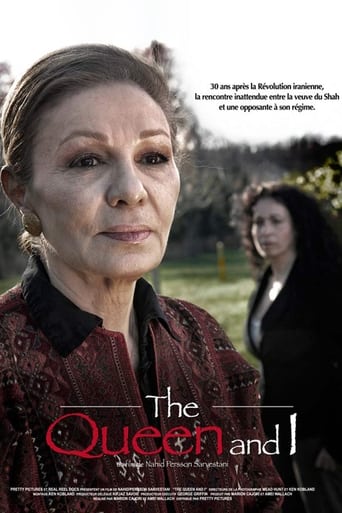DevikaSethi
After revolutions happen, it is rarely the case that the participants and the deposed get to meet -- let alone have a conversation with -- each other. The value of this documentary lays in the fact that a child of and participant in the Iranian revolution of 1979 (whose brother was executed in the aftermath, and who herself fled the country) sought out, met, and even began to see things from the viewpoint of Farah Diba, the Shah's third wife and widow, who lives a life of luxury and loneliness in Paris. That these conversations were possible is to the credit of both participants, and Nahid Persson does a remarkable job of showcasing the range of Iranian responses to the Shah and his rule -- from sycophantic Iranian Americans who still consider his son their King, to an Iranian man who was a victim of the Shah's policies. The filmmaker ultimately fails to ask some hard questions, and Farah is naturally suspicious of her motives at times, but in the end a portrait emerges of two women who have both in their own ways been pawns in a game of chess played by history. There is reconciliation, even if there is inadequate emphasis on truth.
filmalamosa
This movie interviews the Queen of Iran (whose husband the Shah was deposed in 1979). It is not the usual sycophant publicity garbage and you can really size up Farah.These figures of history hold a fascination especially if you get a candid look at them.Farah's life was tragic...two of children committed suicide. Humiliation and loss of power is never a joy.But this is what makes her someone you like better.I highly recommend this documentary.RECOMMEND
dromasca
Director Nahid Persson is born in Iran, from a family who was actively opposed to the regime of the Shah. As a young Communist she was among the million of youth who cheered in the streets when the revolution broke and the Shah and his wife, empress Farah flew the country. Although they lived in the same country, the two women were separated by huge social and political differences, and for Nahid as for many Iranians the fairy tale lives of the royals had become the symbols of corruption and repression. Yet, soon after the revolution the dreams of democracy and of a better life proved to be illusions and Nahid and her family found themselves again on the side of the opposition, and eventually had to flew Iran.Thirty years after the revolution the Sweden-settled Persson looks back in this documentary to the time of the revolution, and tries and succeeds to meet the former empress, now living as a refugee, but a different kind of refugee, in order to understand not only what she has become, but also her own feelings towards a woman who decades ago symbolized for her evil, and now is living at least from some aspects a similar life of longing for the lost country. The film includes the interviews with Farah, and these are more or less what you can expect. The former empress is living the life of a high-class, jet-style refugee. Her views did not seem to have changed too much in the decades since the fall from power of the Shah. Neither does the director want to push too hard questions on her. These are asked a few time off-screen, but they seem to have been shared much more with the viewers of the film than with the subject of the interviews. Maybe it's a sign of respect, or maybe it is the strong and fascinating personality of Farah who wins the heart of the director, or maybe the shared fate of the two women is more important than any other story told in the film. Made and issued to screens around the time when many other documentary films about the fall of the Shah and the Islamic revolution were made 30 years after the events, 'The Queen and I' is one of the more interesting, and the human story occupies a better place in this film than the political one.
thesuperjrs
This film gives a fascinating and enlightening portrait of the last Queen of Iran, Farah. I knew very little about her prior to viewing this film, but now I feel as if I know her intimately. The filmmaker definitely treads a fine line between wanting to confront the Queen with the Shah's transgressions and viewing the Queen as an elegant and refined woman whose life of luxury and privilege has ultimately turned to be one of disappointment. By the end of the film the hard questions have been asked and answered; whether or not the viewer chooses to accept the explanations is up to him or her. It is very obvious to me that, despite the oppressions imposed during the Shah's regime, Iranians would be far better off today were they still under his rule instead of being a theocracy run by evil zealots.

